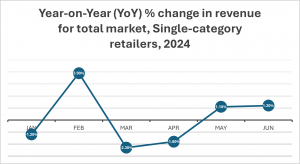By Ellie-Rose Davies, Content Executive at IMRG
Retailers operating within a niche, e.g., they sell very specific products or are single category, may struggle to attract their target customers, often having to navigate specific demographics and psychographics.
This blog reveals some of the success stories for retailers within niche markets, as well as tactful tips to help you accelerate growth for the rest of the year and beyond. Read on to hear from industry experts in this field and benefit from their advice on optimising your strategy.
How are niche/specialised retailers performing in 2024?
The data presented on the chart reveals that single-category retailers have had mixed performance so far this year, with some months seeing Year-on-Year (YoY) growth and other months seeing declines.
Interestingly, and perhaps unsurprisingly, budget/value single-category retailers are having a better time than mid-market and premium retailers, where 5 out of the 6 months reported positive-territory growth.

Multichannel single-category retailers are driving this growth, meanwhile online-only single-category retailers are having a difficult time and have reported declines all year.
While growing revenue can be a strenuous task for specialised retailers, IMRG has found that these retailers are more likely to have higher conversion rates than their multi-category counterparts. The reason being is that their products are so niche that a customer will only go on their website if they really want or need the item, e.g., bouquets of flowers and household tools.
**IMRG’s Digital Dashboard provides more detailed information that can help you benchmark your performance.**
Expert Linnworks says, many ‘Single or specialised category retailers face several distinct challenges compared to multicategory retailers, including a limited customer base, making scalability difficult. They also struggle with building brand awareness due to their narrow focus and face intense competition in saturated markets.’
‘Economic sensitivity is another issue, as niche products often rely on discretionary spending. They may have fewer opportunities for cross-selling or diversifying revenue streams, which can impact financial stability, shares Linnworks.
However, with an effective strategy, retailers can reap the benefits of being more specialised. They can:
- Build a community and drive engagement
- Benefit from marketplace models, and
- Provide elevated experiences for repeat custom
Build a community and drive engagement
One way for specialised retailers to experience growth is through creating a sense of community, helping them to drive engagement from existing and prospective customers.
SEO Account Manager, Kylie Moody at ASK BOSCO reveals how you can grow engagement and build a community through being seen as ‘the absolute expert in your niche by both customers and search engines/algorithms. You can earn authority in your niche and become a known figure by creating awareness in the wider market that could one day be interested in your niche, but perhaps can’t afford it yet or aren’t ready to buy your product right now.’
Kylie says ‘You can do this by answering user queries that are much earlier in the funnel, demonstrating to both users and search engines that you have a wealth of knowledge in your niche and around related topics. Although this won’t bring immediate results and revenue, it can pay off in the long term.’
Umar Butt, Regional CEO of Europe at Aramex provides examples of ‘Giants like Warby Parker in eyewear and Lush in cosmetics’ who ‘demonstrate that strategic precision leads to success. Niche businesses can possess an intimate understanding of their audience’s desires and behaviours.’ By foregrounding customers’ shared interests in marketing, retailers can grow the community element of their business.
‘To elevate performance, they can harness advanced data analytics, create immersive customer experiences, and relentlessly innovate,’ says Umar. He notes that lots of ‘Customers engage more deeply with niche brands, drawn to their specialised expertise and authenticity. By amplifying their unique strengths, niche retailers can achieve unparalleled market dominance.’
One way to grow the community element, according to Alexander Otto, Head of Corporate Relations at Tradebyte, is through ‘Specialised marketplaces’ which can enable ‘niche retailers to unlock new audiences and “find their tribe.” From Vinted for C2C recommerce to Etsy’s unique, vintage and handmade offering, these category-specific platforms are accessible and scalable, catering to sectors that are too niche or complex. They optimise the retail experience for both seller and consumer and build a strong community to effectively attract and retain target customers.’
‘A great example is German marketplace Limango,’ says Alexander. ‘Targeting families with products dedicated to family life, Limango’s business model revolves around offering exclusive, time-limited sales to its loyal membership base. Leveraging data for personalised marketing and maintaining a strong focus on user experience, it creates a compelling value proposition for both customers and retailers who can tap into a highly engaged and relevant market.’
VP of Product Marketing, Bill Schneider at SheerID further explores the topic of effective targeting to drive engagement. He says niche markets ‘provide unique opportunities to create differentiated offers for specific consumer communities that build deeper engagement and customer loyalty.’
‘One way retailers have achieved both,’ reveals Bill, ‘is through gated offers to communities that are specific to their niche. For example, a company that sells scrubs with unique fabric designs can create a discount offer for healthcare workers and promote it through social media to encourage sharing within the community. Research shows this kind of niche marketing is effective at customer acquisition – 97% of healthcare workers say they would share an exclusive discount with other healthcare professionals.’
Noel Hamill, Global Chief Marketing Officer at parcelLab, agrees that ‘By engaging customers with timely updates and customised offers, retailers can drive repeat business and loyalty.’
Retailers can grow a community by focussing on what matters to them. For example, ‘Embracing sustainability through practices like the circular economy can appeal to environmentally conscious consumers, opening new revenue streams. Transparency and a seamless omnichannel experience can build trust and satisfaction.’ Noel says, ‘Retailers that focus on these areas are more likely to thrive in today’s competitive market.’
Benefit from marketplace models
As introduced by Tradebyte, the marketplace model can drive positive results for specialised retailers selling niche products. By embracing marketplaces, single-category retailers can attract customers interested in shopping for a variety of products without the pressure to expand their own product offerings.
If they do wish to expand their offerings, marketplaces provide a low-risk way to test new products without requiring significant inventory investment.

This flexibility can help niche retailers trial and test new strategies and puts them in front of more customers.
Pete Robertshaw, Head of eCommerce Consultancy at Space 48 shares that it is tough to ‘maximise return on ad spend (ROAS) without the ability to increase order size through related products.’
To improve performance, Pete recommends retailers to expand their range through the marketplace model, which can enable retailers to ‘incorporate complementary items without handling fulfilment. Future trends indicate a rise in niche brands adopting drop shipping or marketplace models to diversify offerings and enhance market appeal.’
Pete continues, ‘Leveraging lookalike audiences for targeted acquisition and employing a “good, better, best” product strategy can also drive growth. Customers engaging with niche retailers often seek personalised experiences and extensive product research. They value reviews and trustworthy service. Finding similar profiles with these values allows you to expand your reach even in small markets.’
Provide elevated experiences for repeat custom
Creating a positive experience at each stage of the customer purchasing journey is essential for fostering customer loyalty and encouraging repeat business in niche retail.
Sean Sherwin Smith, Product Director Post-Purchase at nShift describes how ‘niche purchases are an ‘experience’ for the shopper and therefore the more enjoyable the experience, both during and after the purchase, the greater the loyalty and advocacy is generated.’
He says, ‘When it comes to the post-purchase experience, too many retailers treat deliveries and returns as a purely logistical issue. But for a niche retailer, delighting a customer in this part of the journey can make a real difference because their package is more than parcels and boxes but something truly special.’
Sean urges retailers to ‘use the post-purchase journey to curate a highly-personalised and memorable experience that will result in repeat custom, often reducing time to next purchase and the all-important customer endorsement to their social group. And that, as we all know, is the most powerful form of marketing.’
Gavin Murphy, CMO at Scurri says ‘Niche retailers who offer a product that requires some form of specialist delivery – be it a two-person delivery for bulky goods like furniture, or a high-value goods delivery, for example – can make sure their carrier strategy is finetuned to provide continuous access to avoid disappointed customers.’
‘General eCommerce merchants often ship high volumes of small to medium size parcels which are suitable for most ‘standard’ and widely available delivery services – and this means they are somewhat protected from the risk should a carrier or third-party logistics (3PL) provider suddenly become unavailable.’
Gavin continues, ‘Niche retailers on the other hand, often with their unique shipping requirement, have access to a smaller number of specialist providers for delivery. Therefore, they can prioritise access and agility within their carrier network, with the ability to quickly swap delivery partners should the need arise and ensure all orders are fulfilled quickly and their customer promises remain upheld.’
Amal Ahmed, Director of Financial Services and EMEA marketing at Signifyd shares how ‘Signifyd’s data shows that 68% of shoppers would be likely or very likely to look for the same product with a large company if they’ve had a bad online shopping experience with a small company.’
‘Success can come from harmonising the customer experience, fraud protection, and reducing friction in payments. No matter the size, merchants can be savvier about the evolving fraud landscape, particularly at a time when friendly fraud and returns abuse are on a rise.’
Growing in niche markets involves understanding your customers’ needs and creating exceptional experiences that keep them coming back. By building a strong community and utilising marketplace models, niche retailers can expand their reach, enhance customer satisfaction, and drive long-term growth and loyalty.
Want to read more? Here are some other IMRG blogs that cover a range of ecommerce topics:
Mastering Mobile Commerce: Enhancing Apps, UX, and Conversion Strategies – IMRG
Top 11 Commerce Trends For Retailers In 2024 – IMRG
Brexit’s Impact On Retail And The Marketplace Opportunity To Thrive – IMRG
Top Cross-Border eCommerce Trends In 2024 – IMRG
Google Shopping Optimisation – Pricing, Titles, and More – IMRG
Published 02/08/2024


